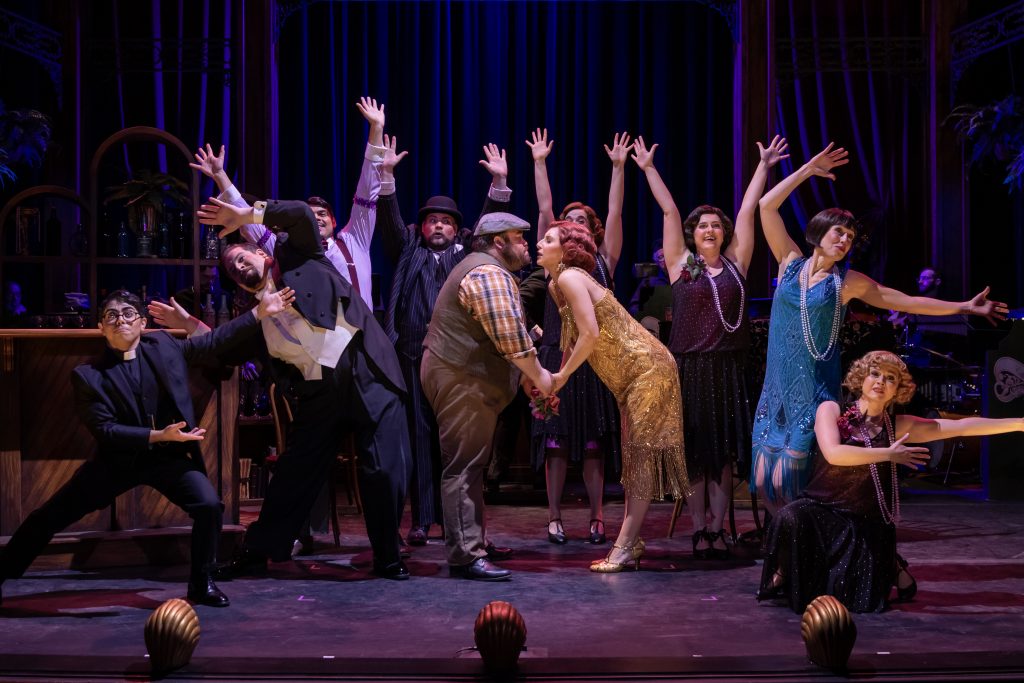Florentine’s ‘Songbird’ Successfully Mixes Opera, Jazz
Show's short but imaginative run concludes Sunday.
If the Florentine Opera Company is concerned about expanding its audience to the adventurous young and novices to classical music, if it wanted to capture new patrons by mixing 19th-century operatic flourishes with 1920s speakeasy jazz, if it wanted an impish enlivening of the standard comic opera pantomime, it couldn’t do much better than its recent “Songbird” weekend.
I suspect the Sunday afternoon audience, like the Friday night opening, will pack the 625-seat house at the Wilson Theater of Vogel Hall in the Marcus Performing Arts Center.
For decades, the Florentine has followed the only-two-shows format two or three times a season for its big operas next door at the PAC’s mammoth Uihlein Hall (2,125 seats). Sometimes with lesser-known operas, the Florentine has run for two weekends at the 625-seat Wilson. Sometimes only one weekend.
By the time many of you read this, the one-weekend “Songbird” will likely have flown away. With it went a lot of good work.
While the storyline requires some willing illogic by the audience, and some false frolic updated to an illegal New Orleans nightclub in the 1920s – this one with Mardi Gras dress and a 10-piece jazz band onstage concocted in part by the Milwaukee Symphony Orchestra – a lot of craft was on display plus solid instrumentalists and singers (some with acting chops and good dancing kicks).
It was 90 minutes of colorful fun and glorious melodies, the melodic gifts not surprising since “Songbird” is a talented 2021 adaptation of Jacques Offenbach’s comic operetta “La Perichole.” The squads of adapters (both book and orchestrations) need to be applauded. That’s particularly true in how they and the supertitles create June-moon-spoon English rhymes (plus puns) to dovetail with lyrical French words. (The French help is nice but not needed since the dialog is in English.)
“La Perichole” alias “Songbird” lends its lively punctuation to the Dixie jazz motif and the clever classical underpinnings of conductor Robert Mollicone, whose jacket changes as he is made part of the plot by stage director Jill Anna Ponasik.
Perhaps I am unfair to the many backstage craftsmen being employed by the Florentine, (producing nice costumes and props) but I credit Ponasik with the inventive movement and drollery (and the fleeting reminder of Offenbach’s famous “Can Can”), efforts that interweave the entire cast on the Wilson/Vogel Hall stage. Singling her out is based on her previous work at the Skylight Theatre as well as at the Milwaukee Opera Theatre and the Florentine.
In fairness, I have to blame her as well for the occasional lapses into unjustified group gaiety, trying to escape the broader holes in the plot. Even the overly antic mistakes never pulled me out of grinning enjoyment.
Crowded as the stage is with orchestra in back, chairs in the middle, bar stage left, tropical plants and other constrictions, Ponasik still finds ways for performers to humanly link to each other across barriers, cart out a jail cell and turn it into a comic prop or suddenly allow scat singing and tap dancing to carry out an Offenbach tune.
The plot involves a loving couple of street performers who get into romantic tangles with a conniving mayor. Even if you think you don’t know “La Perichole,” along the way come famous Offenbach melodies (author of 100 operas he often stole from himself, so no plagiarism complaints here). The songbird’s farewell letter to her beau is actually a famous melody lifted for many stage projects. Also familiar are her musical attack on men as oafs, her tipsy song and the company’s ode to marriage.
Often the case in operettas, the story has to be rescued by persuasive singing and long-held notes. And here, rather than relying on imported big names, the Florentine turns loose its own Baumgarten Studio artists and alums to good effect – 10 in all. They make for quite a powerful chorus plus some neat solos.
As the lead songbird, Lindsay Metzger overacts a bit but her mezzo soprano is beautifully attune to the lyricism and echo-chamber depth the part requires. Her singing drew constant applause. So did the tenor high notes of Aaron Short, who had a down-home warmth as her oafish paramour.
As the conniving self-admiring mayor – with what I took as deliberate parody of Trump – baritone Zachary Crowle sang so well as to turn the villainous edge into humor and then amuse us with a final acrobatic minute of juggling oranges.
The female trio at the booze-happy Club of Muses – let’s pretend they are working there as barkeeps – was well sung by Laura McCauley, Alisa Jordheim and Tzytle Steinman (who gets to throw in some comic dancing).
I would argue that the “Songbird” is so imaginative as to be a bit rough around the edges, a problem that could have been solved with a longer run.
Dominique Paul Noth served for decades as film and drama critic, later senior editor for features at the Milwaukee Journal. You’ll find his blog here and here.
If you think stories like this are important, become a member of Urban Milwaukee and help support real, independent journalism. Plus you get some cool added benefits.
Review
-
Eating Burmese in Bay View
 Dec 13th, 2025 by Cari Taylor-Carlson
Dec 13th, 2025 by Cari Taylor-Carlson
-
Casablanca Is a Milwaukee Success
 Nov 30th, 2025 by Cari Taylor-Carlson
Nov 30th, 2025 by Cari Taylor-Carlson
-
Oh, Those Witty 18th Century Brits
 Nov 24th, 2025 by Dominique Paul Noth
Nov 24th, 2025 by Dominique Paul Noth
Theater
-
Oh, Those Witty 18th Century Brits
 Nov 24th, 2025 by Dominique Paul Noth
Nov 24th, 2025 by Dominique Paul Noth
-
Skylight’s Holiday Show Is Lots of Fun
 Nov 16th, 2025 by Dominique Paul Noth
Nov 16th, 2025 by Dominique Paul Noth
-
Rep’s ‘Come From Away’ Is a Triumph
 Nov 10th, 2025 by Dominique Paul Noth
Nov 10th, 2025 by Dominique Paul Noth


















